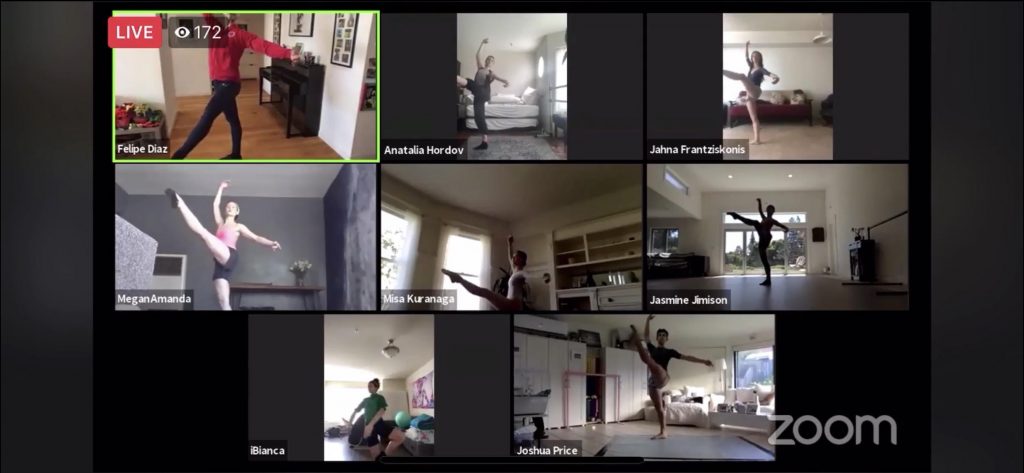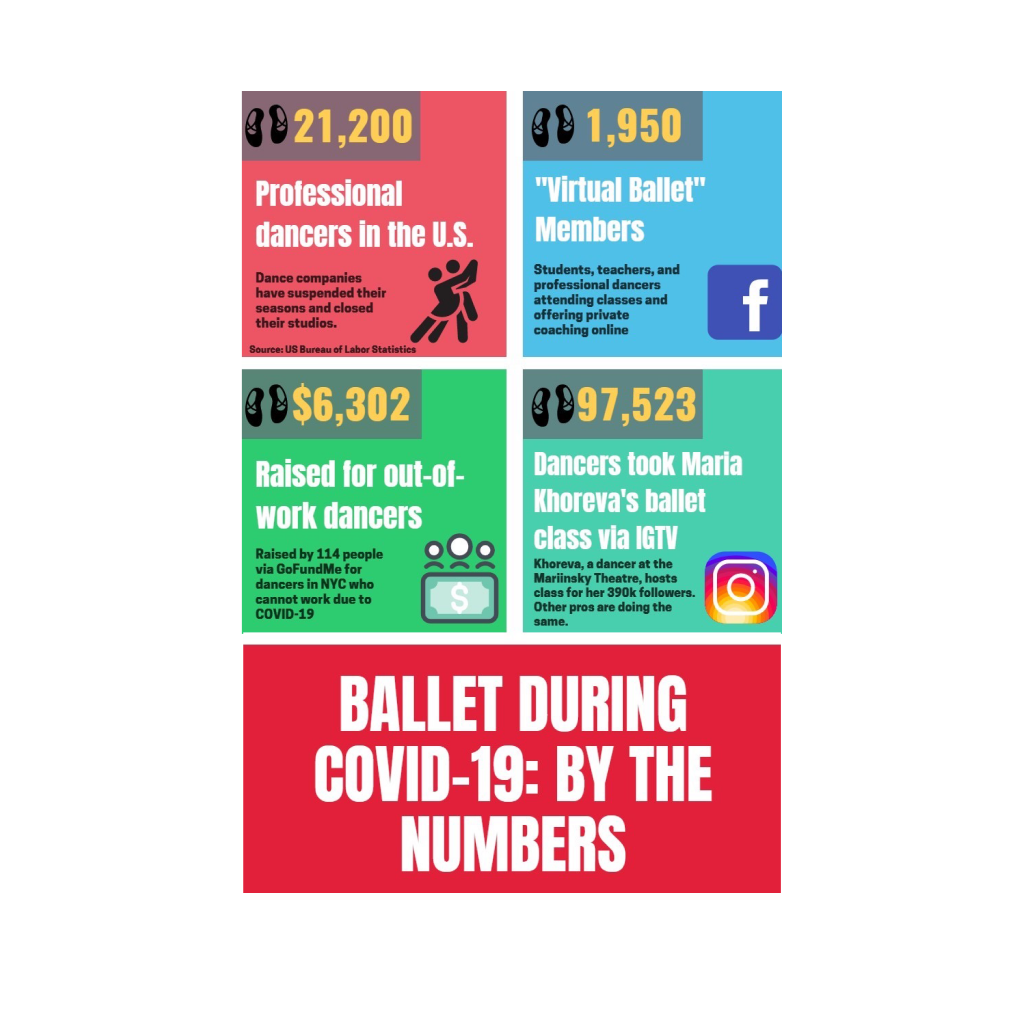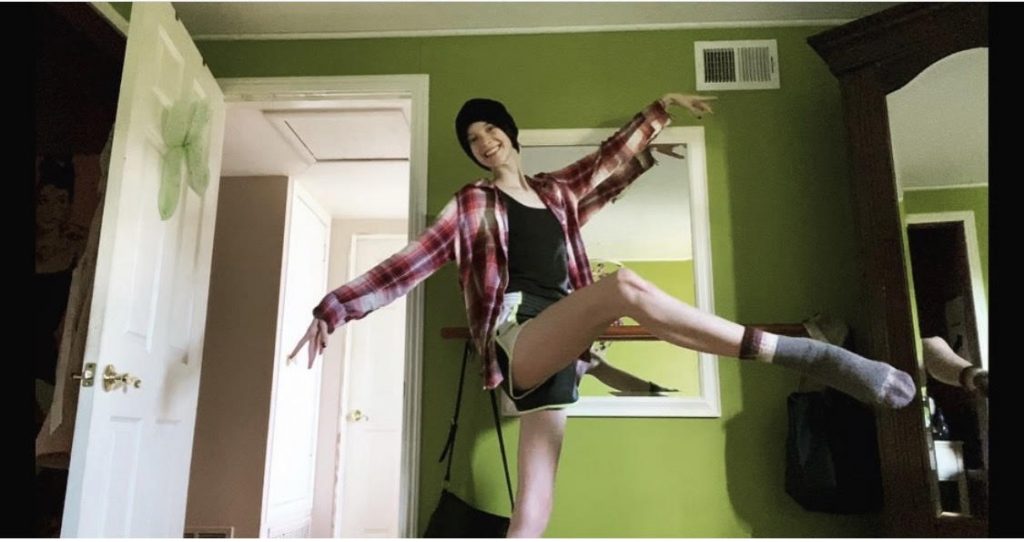With studios closed for the foreseeable future, dancers turn to online classes to stay connected and in shape.
By: Megan Ely

Around the world, schools and businesses have closed their doors for the foreseeable future due to the coronavirus outbreak. Live performances have been cancelled as audiences stay home. But for people like ballet dancers who rely on studio space and live performances for their jobs, the pandemic has moved their career online.
The change of venue from concert halls and studios, in which all performing arts have been cancelled across the globe, to online classes and shows has been more jarring for some performers than others, and ballet may be one performing arts that has reached deep to make the difficult transition.
Staying in shape and having space and opportunity to move is imperative for dancers. In a career where the body is the main focus and instrument, losing access to regular training and studio time has impacted the ballet community. Daily classes, usually held in a studio full of peers, have moved to video conferencing platforms like Zoom where dancers participate from their homes.
The shuttered ballet community has found several ways to stay connected and in shape even in these uncertain times.
Social media has become a hub for dance classes and coaching. Major ballet companies like San Francisco Ballet, have been livestreaming their daily classes on Facebook so dancers can follow along and take class with the professionals they would usually watch on stage.
Ballet dancers across the globe are adjusting from the studio to their homes, keeping up with daily classes and staying connected. Coronavirus has not only kept dancers from the studio, but cancelled performances have resulted in a major loss of income for ballet companies and their dancers.
Professional dancers like American Ballet Theatre’s Isabella Boylston and James Whiteside, Mariinksy’s Maria Khoreva, and Houston Ballet’s Tyler Donatelli have been hosting ballet classes on Instagram Live and IGTV for their followers. Thousands of dancers have tuned in and danced along.
Mikhail Tchoupakov, a former professional ballet dancer and current associate professor at the University of North Carolina School of the Arts, started a Facebook group called Virtual Ballet when COVID-19 first started forcing studios to close. The group now has over 2,500 members, from teachers offering private and group coaching, to students and parents sharing how they are staying in shape outside the studio. The group also hosts a mentorship program where coaches and students can learn directly from each other in a way that they might not have been able to due to distance or scheduling before the coronavirus lockdown.
Tchoupakov started Virtual Ballet as a way for the ballet community to “stay in shape and stay safe” after he heard from students who were concerned about keeping up with their lessons at home.
“I had some requests from concerned parents and students who had no place to go and continue their training, and I decided to not just do my little contribution by teaching a few classes, but have a place online where teachers and students/parents can find each other,” Tchoupakov said.
“Hopefully Virtual Ballet group will be a place where teachers can find supplemental income and students and parents find a professional to conduct virtual ballet classes for their young dancers,” he said.
While some teachers like Tchoupakov are still being paid by the school they work at, others, especially at private schools and studios, have lost their income. So, Tchoupakov has encouraged the members of Virtual Ballet to donate to the teachers who offer coaching and also to contribute to the AGMA Relief fund, which is administered by The Actors Fund and supports some of the dancers who lost their jobs during the lockdown.
“Most of the arts organizations in the U.S. are supported by the communities and private corporations where they operate and not by the government like in Europe… Many theaters, ballet companies and private ballet/dance schools might not survive this terrible economic challenge and will be forced to close,” Tchoupakov added. “I hope we all do something, maybe just a little bit to help the art organizations and the dance schools to survive.”
For students and professionals alike, Tchoupakov encourages dancers to take this time to find new ways to stay in shape and educate themselves on their art form by watching online performances, reading, and listening to music at home.
“We are all going to find a way to adjust to this terrible situation and maybe even learn a thing or two what we couldn’t do in our normal, very busy, regular lives,” said Tchoupakov.

While the ballet community, like much of the world, has been plunged into a state of uncertainty during the COVID-19 pandemic, dancers have found silver linings in their classes being moved online.
Alysa Reinhardt, 20, has been doing ballet for 16 years and most recently was a dancer with the New Ballet in San Jose, Ca. Reinhardt was diagnosed with lymphoma in December 2019 and has not been able to dance with her colleagues since she went home to Southern California for treatment.
When the New Ballet moved their classes online, Reinhardt had what she described as an “amazing” opportunity to dance with her friends for the first time in months. “The ballet world going online helped my mental state so much, it made it so finally felt like part of the company again,” she said.
“It’s definitely strange and different but we’re making it work. My company even ran a Swan Lake rehearsal over video chat” Reinhardt said. “We’re all just ballet dancers taking class, the only thing that’s different is our locations.”
Reinhardt said the way the ballet community has responded to COVID-19 has been inspiring and they have handled the uncertainty well.

Photo: Alysa Reinhardt on Instagram
“Everyone has stayed calm and remained as positive as we could, despite obvious financial loss. We’re really coming together to show the world how powerful, important, and resilient the arts are,” she said.
Natalie Matsuura is a member of the corps de ballet at Oklahoma City Ballet. As a professional dancer, she has directly felt the impact of the pandemic on her own career.
While she said the remainder of Oklahoma City Ballet’s performance season was cancelled and the studios closed, her supplementary work as a dance teacher transitioned online and only one studio where she taught furloughed all its teachers. As for her online classes, Matsuura has seen near-perfect attendance in the weeks since the outbreak sent her students home.
Although her season was cancelled, Matsuura has found ways to stay in shape. “There are a lot of wonderful classes available through IG-TV and YouTube right now. I’ve been taking those virtual classes at home and taking advantage of other free workouts and free fitness apps being offered during this time,” Matsuura said.
Matsuura is encouraged by the way the ballet community has responded to the shift to online classes. She said moving online has “eliminated the physical/geographical (and even talent) barrier” for dancers. “For example: thousands of people from all over the world are tuning in to Instagram every morning to take class with [New York City Ballet Principal] Tiler Peck as she leads ballet class from her kitchen. Beginners are able to “train” alongside professionals,” she explained.
The shift online has kept Matsuura close with her colleagues at Oklahoma City Ballet and with her students. “Zoom has allowed us to take class together as a company from our homes. As a teacher, being able to work with my students virtually has given us precious time ‘together,’” Matsuura explained, “I feel like it has strengthened our sense of community.”
“I feel like [COVID-19] unified and humanized everyone (our role models, teachers and students) since we’re all going through this together,” Matsuura observed. “The world’s most esteemed professionals are training in their kitchens with the same resources as regional company dancers, children and amateurs.” Seeing the inside of the homes of professional dancers whom she admires has been an “interesting reality” for Matsuura as well.